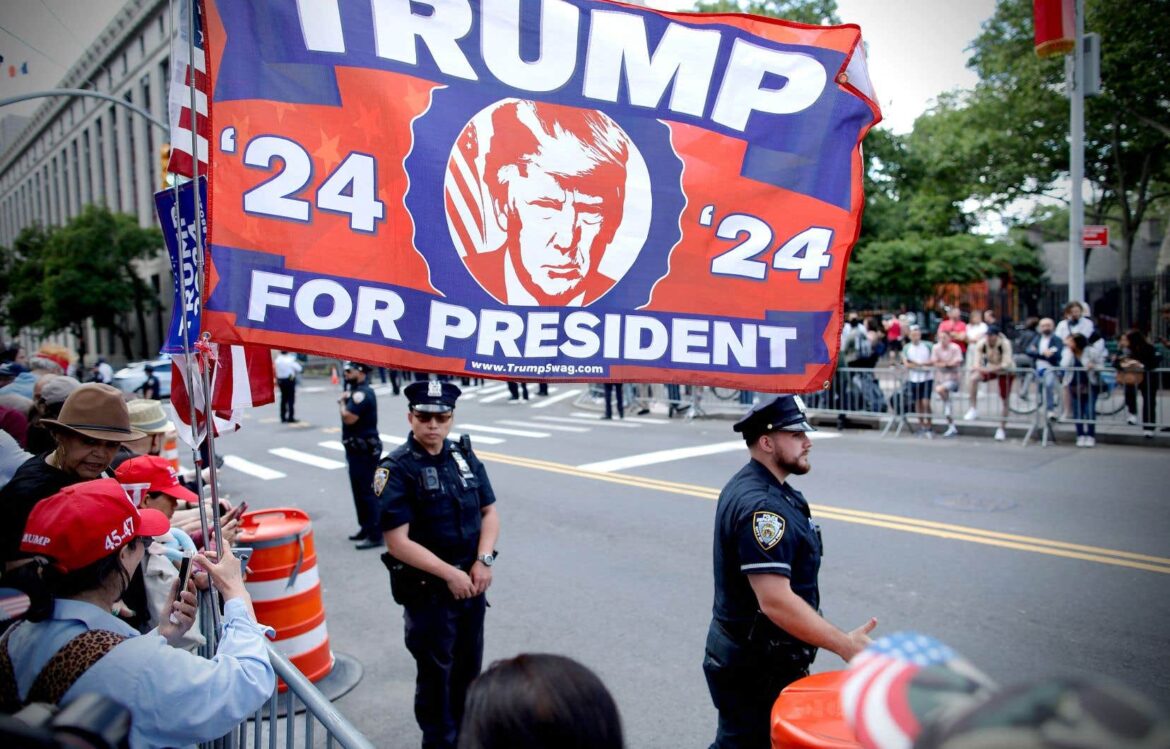May 30, 2024 will go down in the annals of American history: for the first time, a former President of the United States was convicted after a criminal trial. A jury of 12 uttered the word “guilty” 34 times, once per count of falsifying business records, documents that were altered to hide the payment of a bribe aimed at to buy the silence of ex-adult film actress Stormy Daniels. The verdict fell on Thursday, but the criminal proceedings are not yet over. What will be the consequences of this verdict and the rest of the legal process for Donald Trump? Explanations.
Can Donald Trump still run for president and vote?
Yes and yes.
The United States Constitution does not prevent a convicted felon from running for office or being elected president.
And Donald Trump will still be able to vote on November 5 — for himself, we can assume. The law is relatively complex, but in summary, since he was found guilty in New York State, he will be able to place his ballot in the ballot box. State law does not prohibit people with convictions from voting. The result would have been quite different if he had been in prison on that date, but this will probably not be the case for Donald Trump in November.
The state of Florida, where he resides, prohibits convicted felons from voting. But in the case of the former Republican president, his conviction fell in another state and Florida falls behind the rules of the latter.
Is an appeal of this guilty verdict possible? If so, what can he appeal?
Donald Trump can appeal the verdict — but not right away, warns Anna Cominsky, a law professor at New York Law School, in the state where this historic trial was held. He must wait for his sentence to be pronounced: this stage must take place on July 11. When he knows his fate, he will be able to serve a “notice of appeal”, both for his verdict and his sentence, she explains.
With this appeal — which he will likely file — he can’t do everything. Thus, he cannot ask the first level of appeal to review the assessment that was made of the facts or the credibility of the witnesses: because a jury does not reveal why it leaned towards this guilty verdict rather than the other way around. . But Donald Trump will be able to order the Court to change the verdict by arguing that the judge gave erroneous instructions to the jury for its deliberations. Or again, he can complain about judgments which were rendered during the trial, for example, on defense objections which were rejected, on testimony which went too far for his liking or even on the filing of evidence that may have had an impact on the jurors’ decision, underlines Mme Cominsky, who is also director of the Criminal Law Defense Clinic at her university. In short, “on everything that prevented the defense from doing what it wanted” in court.
Will there be a sentencing hearing?
Yes. On July 11, the Manhattan district attorney and Donald Trump’s lawyers will likely present their oral arguments to justify their proposed sentence — after providing their written arguments. The main interested party can also contact magistrate Juan Merchan, the same one who presided over the trial. “It’s up to him (Trump) to decide,” says M.me Cominsky to indicate that he is not obligated, just as he did not have to testify at the trial. The sentence will be handed down on the same day of the hearing. On that day, he will be certain of his fate.
If a prison sentence were to be imposed, Donald Trump’s lawyer could immediately request that it be stayed during the appeal process.
What punishment can we expect?
The offense for which he was convicted — 34 times — carries a maximum prison sentence of four years. But Professor Cominsky believes that incarceration is “unlikely”.
Judge Merchan can take into account a host of factors in deciding the sentence, and will evaluate “everything” about the accused, now convicted: here, he may consider that it is a non-violent crime and a first conviction. Expressed remorse can also weigh in the balance.
She believes a fine or probation is much more plausible. Probation means that the ex-president will be monitored for a certain period and that a series of conditions will be imposed on him: reporting once a month to his probation officer, not committing other crimes, etc. Failure to comply with his probation conditions could lead a judge to tighten them or even send him behind bars.
How long can it take before an appeals court rules?
The appeal process normally takes more or less a year. But the Court can treat the case “as a priority” and deliver judgment in six to eight months, indicates the law professor.
And another appeal is then possible to the New York Court of Appeals — the highest court in the state. Normally, the decision is final, unless the ex-president’s lawyers raise questions of national interest which could justify a detour to the Supreme Court. “It wouldn’t surprise me if his lawyers tried to find a way to do it,” says the professor who teaches litigation techniques in particular.



